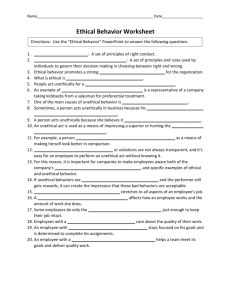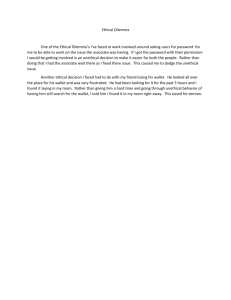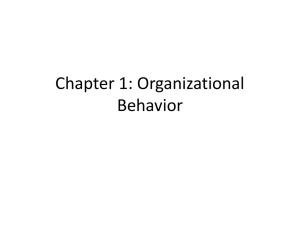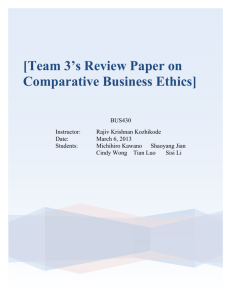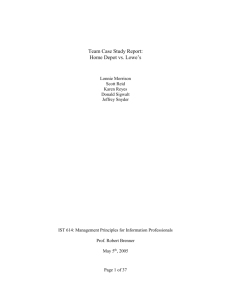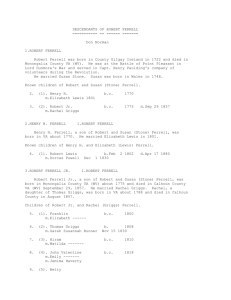File - Tabatha Lakkala
advertisement
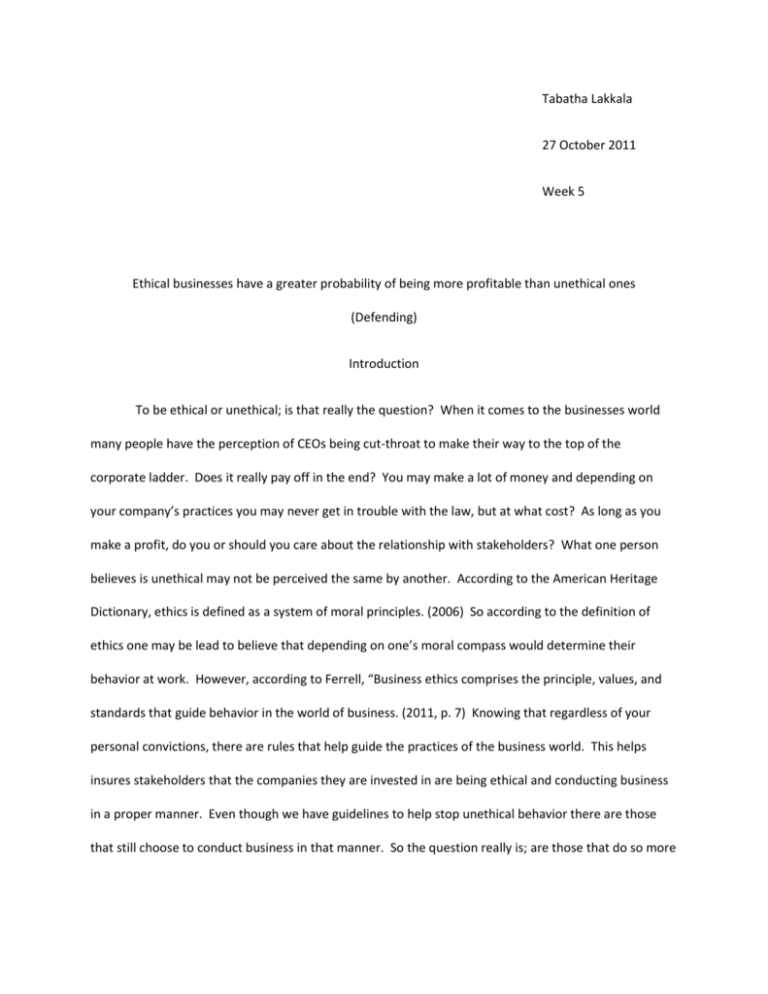
Tabatha Lakkala 27 October 2011 Week 5 Ethical businesses have a greater probability of being more profitable than unethical ones (Defending) Introduction To be ethical or unethical; is that really the question? When it comes to the businesses world many people have the perception of CEOs being cut-throat to make their way to the top of the corporate ladder. Does it really pay off in the end? You may make a lot of money and depending on your company’s practices you may never get in trouble with the law, but at what cost? As long as you make a profit, do you or should you care about the relationship with stakeholders? What one person believes is unethical may not be perceived the same by another. According to the American Heritage Dictionary, ethics is defined as a system of moral principles. (2006) So according to the definition of ethics one may be lead to believe that depending on one’s moral compass would determine their behavior at work. However, according to Ferrell, “Business ethics comprises the principle, values, and standards that guide behavior in the world of business. (2011, p. 7) Knowing that regardless of your personal convictions, there are rules that help guide the practices of the business world. This helps insures stakeholders that the companies they are invested in are being ethical and conducting business in a proper manner. Even though we have guidelines to help stop unethical behavior there are those that still choose to conduct business in that manner. So the question really is; are those that do so more profitable than those that follow the rules? I personally believe that businesses that are ethical and conduct their companies as such have a greater probability of being more profitable in the end. Opinion As stated previously I believe ethical businesses have a greater probability of being more profitable than unethical ones. I have worked for companies that have portrayed both of these qualities and I was much happier that the company that treated their employees fairly and were honest. Companies that care about the interest of their stakeholders I believe will have a greater likelihood that when times are hard, the stakeholders will be more understanding and support the company in return. According to Ferrell, “These groups are influenced by business, but they also have the ability to influence businesses; thus, the relationship between companies and their stakeholders is a two-way street.” (2011, p. 31) Ethical misconduct and decisions that damage stakeholders usually impact the reputation of a company, breaking the trust between investors and consumers. (Ferrell, 2011) Nothing can kill a company faster than bad press, it can poison stakeholders’ opinions against a company whether the charges in the media are valid or not. If we were to look back at the case studies done during this class: Home Depot, Countrywide Financial, Wal-Mart and TYCO; each one had different ethical issues brought to the table. Each company handled those issues in ways that either had you cheering them or hoping that they would fail. When asked about a company being ethical and still making a profit, I am taken back to the case study on Home Depot. Here is a company that I feel has their act together. According to Ferrell, “Since its inception, Home Depot has been focused on close customer relationships.” (2011, p, 467) The company’s attitude towards customer relationships and being environmentally responsible has continued to prove beneficial to the home improvement store. Home Depot like many companies during the 2008 recession took a hit. The company decided to stop expanding their stores dramatically and shut down Home Depot EXPO stores altogether. (Ferrell, 2011) According to Ferrell, “Home Depot managers transferred all extra cash to Home Depot headquarters, cut capital spending and suspended a stock buy-back program in order to avoid losses and prevent having to borrow for the country’s lenders.” (2011, p. 472) Instead of expanding like its competitor, Lowe’s, whom of which took advantage of low cost of labor and land. (2011, p. 472) This act showed at Home Depot was not taking advantage of the recession, but there are those that will argue that Lowe’s was creating jobs during that time. But at what cost? Home Depots’ gamble during the recession has paid off. Based on net sales for the end of fiscal year 2011, Home Depot is the world’s largest home improvement retailer. (Utah Bussiness.com, 2011) According to Investorsguide.com, “As the housing market started to make baby steps in the right direction, Lowe’s continued to have issues. Quarter after quarter the company watched sales and profits decreased, missing analysts’ expectations. The company was forced to make cutbacks and even close some stores that had been open less than a year.” (2010, para3) In contrast, Home Depot continues to help create jobs instead of cutting them, I feel that being more ethical and socially responsible has proven to have greater profits and is generally more accepted by the community. I worked for Sallie Mae, a student loan company who happens to be the sister company of the well know Fannie Mae and Freddie Mac. These companies are always making headlines for unethical behavior. As a low level call center representative, I really didn’t care what the media was saying at the time. I was young and needed a job, little did I realize then that the unethical behavior was trickling down and affecting the workers as well. When I look back and focus on the bigger picture I can see now why I did not stay with the company for a long time. Even though working for Sallie Mae meant that I was at the highest paying job in my town at the time, without a college degree. I recall mandatory overtime without any notice, those with children would have to scramble to find babysitters and ways to get children from school. Since I was a call center technician, my calls and call times were recorded. If I was off the phone for more than two minutes, the supervisor would call me asking me what my problem was. If I was not at my desk, then it had to be in the log book but it was still questioned. An example for me, I went to the bathroom and was questioned why I was gone for five minutes. Our call center was huge and held over 600 people so to even log off my computer/phone and walk there took more than a minute. It was irritating to have to ask for permission to use the restroom and have every minute of my day accounted for, so I eventually quit. According to Kidder, “Fannie and Freddie may force us to rethink our winking. They remind us that when little white lies grow gray and concentrated, they turn black as a cloud of locusts, making us all victims as they devour everything in their path.” (2008, para5) I saw this quote and laughed thinking this could apply to all aspect of their companies, from the CEO level down to the mailroom employees. Creating a level of trust within the company will affect all aspects creating more profits in the end. How much money and time did the company lose because I quit, probably not that much. However, now you have to hire, background check and do a six week training course for another person and how many others quit for the same reasons? Conclusion To say that companies that are ethical are more profitable, there is a lot of contrast in that statement. Most people do not think of Wal-Mart as being ethical but they are still highly profitable. I think in the end you must look at all the stakeholders involved and consider the fallout from your behavior. I know people that truly despise Wal-Mart and will not shop there because of the way that they conduct business; I have never heard the same for Home Depot. Will you make a profit even if your behavior is not generally accepted by the public? Yes, I believe you can but being profitable means more than just making money to me. Look at factoring in cost of lawsuits, payouts, public addresses, unhappy stockholders and trying to fix issues and problems that should not have taken place to begin with. How much are you really making? Being socially responsible from the start will fare better for all parties involved because no opinion is stronger than public opinion. Being profitable is not only monetary but being able to sleep at night knowing that you are doing what is right by all. References Ferrell, O.C., Fraedrich, J. & Ferrell, L., (2011). Business Ethics Ethical Decision Making and Cases. Mason: South-Western Cengage Learning. Ethics. (2006). In American Heritage Dictionary. Retrieved October 27, 2011, from http://dictionary.reference.com/browse/ethics Investorsguide.com. (2010, February 22). Lowe’s Rebuilds Profit and Tops Expectations (LOW). Retrieved October 31, 2011, from http://www.investorguide.com/article/6118/lowes-rebuildsprofit-and-tops-expectations-low Kidder, R.M., (2008, July 14). ). Fannie Mae, Freddie Mac, and Locust Ethics. Ethics Newsline. Retrieved October 31, 2011, from http://www.globalethics.org/newsline/2008/07/14/locustethics/ Utah Business.com. (2011, October 19). Home Depot to Add 691 Jobs to Utah. Retrieved October 19, 2011, from http://www.utahbusiness.com/issues/articles/11618/2011/10/the_home_ depot_to_add_691_jobs_to_utah




